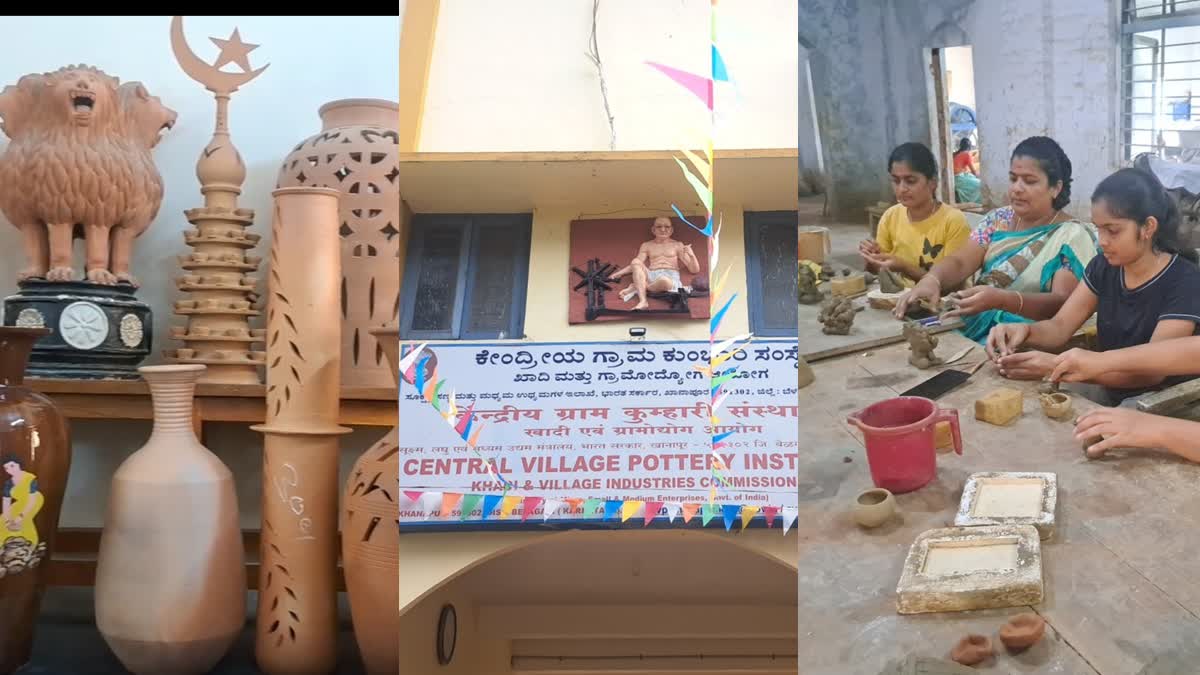Belagavi (Karnataka): In a bid to revive dying art of traditional pottery in the rush of modernity, a pottery institute in Karnataka's Belagavi is preserving the art for the last seven decades.
The Central Village Pottery Training Institute at Khanapur in Belagavi is the country's only institute that has been teaching pottery academically and classically. The pottery training institute was established by the central government in 1954 in an area of three and a half acres on the banks of the Malaprabha River at Rumewadi Cross in the outer zone of Khanapur. Since then, more than 50,000 male and female students from the state and outside states have been trained and have become artisans to earn a respectable livelihood and preserve the art in the process. Many of them are self-employed and entrepreneurs.
Training Youth Of Different States: Apart from Karnataka, young men and women from almost all the states of the country including neighboring Goa, Maharashtra, Tamil Nadu, Andhra Pradesh, Telangana, distant Bihar, Uttar Pradesh, Himachal Pradesh undergo training at the pottery institute. Not only the illiterate, but also highly qualified people are showing great interest in learning pottery.
Courses Offered: At the Central Village Pottery Training Institute, which is functioning under Khadi and Village Industries Commission of Micro, Small and Medium Industries Department, Central Government, one month amateur course, advanced pottery course (jigarjali and slip casting process course), two months terracotta artware course, four months wheel pottery courses are offered. Aspirants aged 16 to 50 years and who can read and write are eligible for the courses. A batch at the pottery institute can accommodate 40 candidates. Apart from free meals and hostel facilities, each student is also given a learning allowance ranging from Rs 1,500 to Rs 3,000 per month.
What is manufactured?
Various types of household items, decorative items, idols, statues, toys, worship equipment are made at the Central Village Pottery Training Institute. The artisans also make 50 liter water heater, drinking water pitcher, food preparation pot, drinking glass, plate, decorative pitcher, hanging chain, flower pot, stove, different types of garden pots, dust bin, clay bottles etc. Besides, training is also provided on how to make ear and neck ornaments.
Self-sustainable: Shesho Narayan Deshpande, senior executive officer of the organization told ETV Bharat that students from all corners of the country can get training and show their skills in clay to produce many works of art. Artwork can be made by hand or by machines.
“Also, after training, they have built a self-sufficient life. There is free food and accommodation facility for the male students. There is food for female students, but no accommodation. So, you have to rent a room or a house outside. Mechanized wheels are also being distributed under the Central Government's Pottery Empowerment Scheme,” Deshpande said. The government is also giving loans to startups related to cottage industries, and take advantage of this, he added.
Unique Khanapur Soil: The soil found in Khanapur taluk is not found anywhere in the entire country of India. The soil here has a unique quality and is rich in iron content.
Pottery trainer Sairama Chatti said that more sticky the material, the more durable it is.
“The Malaprabha river basin has a lot of clay soil. We mix the three soils with the help of a machine. After that, the soil is processed and put in massive kilns and burnt. After the soil is hardened, it is dried and it is ready for use. Then we teach the students what they can make using that soil. Along with pottery skills, information about marketing and loan facilities will be given to the trainees here,” she explained.
Jyoti, a trainee from Bengaluru, said, "I used to make clay items by hand. I came here to learn from machines. The teacher teaches very well. They teach until we become perfect. Next, I plan to go to schools and teach children what works of art can be made from clay."
"Our ancestors used to do pottery. I also wanted to learn. Due to some reasons, I could not learn. I got information that there is a pottery training institute in Khanapura, Belagavi district. So I came here from Telangana. I have learned a lot in the last 20 days. The staff here are training us all well, this is a good opportunity to learn," said Vijayagiri, another trainee from Telangana.
Tejaswini, who has come here from Mumbai for training, also shared her experience.
“It is our wish that more and more people get the benefits of Kumbarika Training Institute, which is ushering in a self-reliant life,” she said.
Read more:




